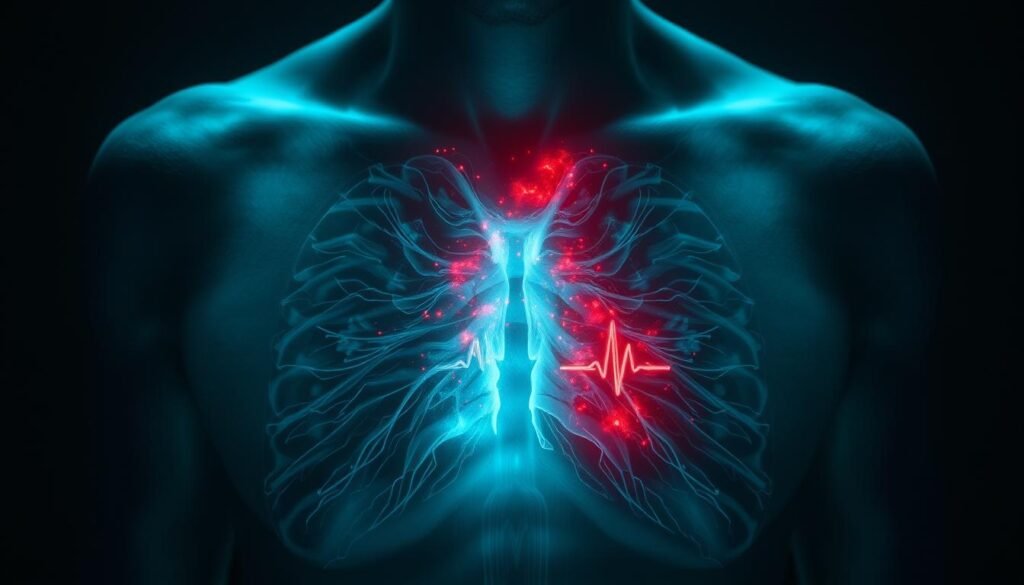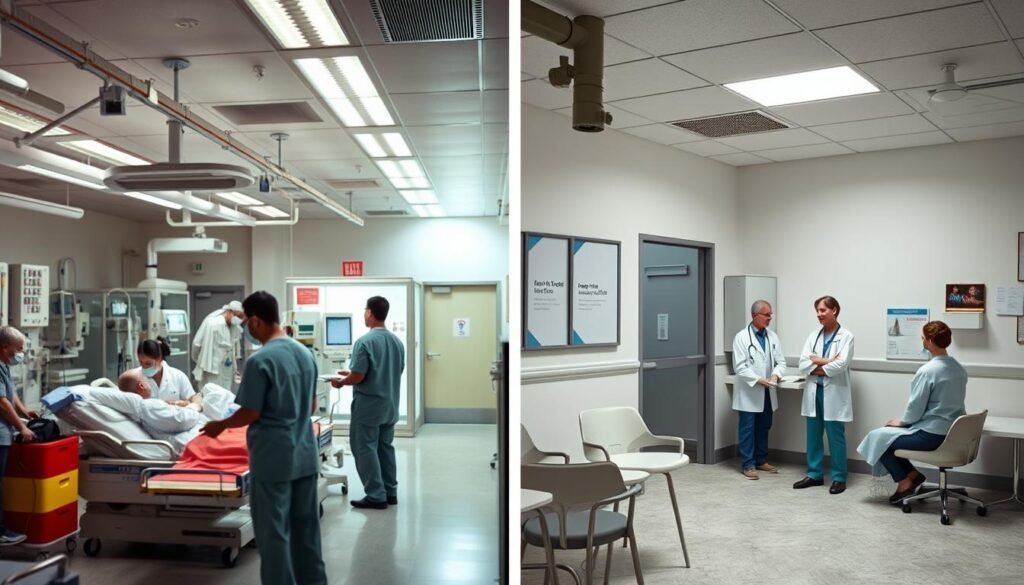In 2012, the most common reason people saw a doctor was a cough. This info comes from the Centers for Disease Control and Prevention. It shows why knowing health issues is key. It is important to know when to seek medical help. Not doing so can make things worse. Know the signs that mean you need care. This helps you look after your health better. You’ll know when it’s time to get help, leading to quicker recovery.
It’s vital to spot symptoms that may worry you. It could be a cough that won’t go away, losing weight fast, or feeling very tired for no reason. Being ahead of health issues can stop bigger problems. If you’re interested in wellness, you might like trying healthy eating or ways to lower stress. At natural remedies for adrenal fatigue, they talk about the importance of listening to what your body is telling you.
Key Takeaways
- Knowing when to get medical advice is key to avoiding worse health problems.
- Signs that you need to see a doctor include chest pain, losing weight quickly, and sudden changes in how your body works.
- Pay attention to urgent signs like severe headaches or trouble breathing that need quick action.
- Getting check-ups regularly is important to catch health issues early.
- Having a strong relationship with your doctor can make your care better.
Understanding the Importance of Seeking Medical Advice
Knowing when to seek medical advice is key to staying healthy. Some people ignore their symptoms or wait too long to see a doctor. This can lead to worse health issues. Getting help early makes it easier to manage health problems, avoid complications, and recover faster.
After an accident, you might not feel hurt right away. You could have internal bleeding, a brain injury, or broken bones without knowing. The rush of adrenaline can hide the pain. So, it’s important to get checked by a doctor to avoid more serious problems later.
Doctors play a big role in finding out how bad your injuries are. They might do X-rays or MRIs to spot hidden damage. It’s crucial to follow their advice and go to all your appointments to heal properly.
Getting better isn’t just about physical injuries. Problems like PTSD and anxiety also need quick attention. Knowing how connected our minds and bodies are shows why medical care is so important.
Patients have rights in their healthcare. Talking openly with your doctor means they can consider your unique history. This way, you get medicine and treatments that are just right for you.
Support from loved ones also helps you recover. A strong support network offers comfort and motivates you to stick with your treatments. This underlines why it’s so vital to listen to medical advice and be active in getting better.
| Condition | Symptoms | Recommended Action |
|---|---|---|
| Internal Bleeding | Abdominal pain, dizziness | Immediate medical evaluation |
| Traumatic Brain Injury | Confusion, headaches | Neuro-imaging assessment |
| Fractures | Swelling, severe pain | X-ray examination |
| Ligament Tears | Joint instability, swelling | Orthopedic evaluation |
| Psychological Trauma | Flashbacks, anxiety | Therapeutic consultation |
Recognizing Symptoms Requiring Care
Knowing the difference between signs and symptoms is key to health awareness. A sign, such as a fever or rash, is something others can see. Symptoms like pain or tiredness are felt only by the person. Understanding this helps us talk better with doctors about our health.
Definition of Signs vs. Symptoms
It’s crucial to know signs and symptoms for health care. Signs are things doctors can measure, like your temperature. Symptoms are personal, like feeling dizzy or upset. Knowing both helps handle health concerns right.
Common Symptoms Indicative of Health Issues
Some symptoms really need attention because they can mean big health problems. A long-lasting cough, trouble breathing, and strong pain could be signs of something serious. If you see these, it’s important to get checked by a doctor.
| Common Symptoms | Possible Health Issues |
|---|---|
| Persistent cough | Respiratory infections, lung disease |
| Difficulty breathing | Asthma, heart conditions |
| Severe pain | Injury, inflammation, organ damage |
| Change in bowel habits | Gastrointestinal disorders |
| Sudden weight loss | Endocrine disorders, cancer |
Symptoms can be short-term (acute) or long-term (chronic). Doctors use these terms to help us know when to seek help. Acute symptoms come on fast and might mean you need help right away. Chronic symptoms happen slowly over time and might need long-term care. Learning about these helps us take charge of our health.
Emergency Situations: When to Act Quickly
Knowing when to get help in an emergency is key. Life-threatening situations call for fast action. Everyone should know the signs and how to react fast for safety.
Life-Threatening Conditions
Conditions that need quick medical help include:
- Trouble breathing or shortness of breath
- Chest or upper belly pain
- Fainting or sudden dizziness
- Confusion or changes in mental status
- Uncontrolled bleeding
- Severe vomiting or diarrhea
- Coughing or vomiting blood
- Trouble speaking or numbness
- Unusual belly pain
Common Emergency Signs
Quickly spotting emergency signs can save lives. Signs needing fast help involve:
- Severe allergic reactions
- Loss of consciousness or major burns
- Spinal cord or brain injuries
- Signs of poisoning or drug overdose
- Broken bones with bone poking through
- Drowning incidents
- Changes in behavior or decreased alertness
- Irritability or unusual behavior
- Severe headaches or vomiting after a head injury
- Breathing difficulties
- Blue or purple skin/lips
- Severe pain or fever with behavioral changes
Being alert to these signs and acting quickly can make a big difference. Know your nearest emergency room and who to call in a crisis.
When to Seek Medical Advice: Key Warning Signs
Knowing when to seek medical help is crucial. Symptoms that need quick action include chest pain and shortness of breath. Also, severe headaches and losing weight without trying are signs to watch for.
Chest Pain and Shortness of Breath
Chest pain with trouble breathing is a red flag for heart or lung issues. It’s important to deal with these signs right away. You might feel discomfort in your chest that comes and goes. If these symptoms happen along with finding it hard to breathe, get medical help immediately. Learn more about these warning signs by visiting this resource.
Sudden Intense Headaches
If you suddenly get a very bad headache, it could mean something serious like a stroke or an aneurysm. This might come with feeling dizzy, trouble talking, or feeling numb. These are serious signs that need quick medical help. Don’t wait to see if they go away on their own.
Unexplained Weight Loss
Losing weight without trying could point to something serious like thyroid problems or even cancer. If you lose more than 5% of your body weight in six months, talk to a doctor. Also, if you’re not feeling hungry or you feel sick and throw up, it’s important to see a doctor. Paying attention to these signs can help catch health issues early.

Symptoms of Chronic Conditions to Monitor
Keeping an eye on your health is key when you have long-term illnesses. It’s mostly critical for those with chronic conditions symptoms. Chronic Fatigue and big changes in bowel habits need quick action, hinting at possible health issues.
Understanding Chronic Fatigue
Chronic Fatigue means you’re always tired and rest doesn’t help. It could point to several health problems like depression or autoimmune diseases. If tiredness lasts, seeing a doctor is crucial to find out the cause.
Long-Term Changes in Bowel Movements
Lasting changes in bowel habits signal health risks. Seeing blood, having diarrhea, or constipation might show irritable bowel syndrome or colorectal cancer. Such changes call for a doctor’s check to avoid worse problems.
Making smart health choices helps too. Some great advice is available via educational programs.
Emergency Care vs. Urgent Care: What’s the Difference?
Knowing the difference between Emergency Care and Urgent Care is crucial. Emergency Care is for life-threatening situations needing fast response. This includes heart attacks, severe injuries, or overdoses. Emergency rooms are open 24/7 to help patients quickly to avoid serious harm or even death.
Urgent Care is different. It’s for health issues that aren’t life-threatening but still need quick care. These places are open evenings and weekends for minor issues like cuts, the flu, or ear infections. They have the tools to diagnose you fast, so you spend less time waiting.
Choosing the right care is important depending on your situation. If you have severe chest pain or heavy bleeding, go to the emergency room. But for small problems like a cold or a small fracture, Urgent Care is a good choice. It’s easier and often faster to get help there.

Knowing where to go helps you get care faster and can save on healthcare costs. Insurance often covers Emergency and Urgent Care differently. So, it’s smart to know these differences before you need care.
Preventive Checkups and Their Role in Health
Regular checkups are key for good health. They let doctors do important screenings and tests early on. This way, they can catch conditions like high blood pressure, diabetes, and some cancers early. Getting preventive care means you’re taking charge of your health.
Importance of Regular Health Screenings
Health screenings are crucial for finding issues before they get worse. They can reveal problems like high cholesterol and obesity, even without symptoms. These checkups also look at your family’s health history. This gives clues about your health risks. During visits, doctors give advice based on your health needs.
Consulting a Doctor for Preventive Care
Seeing a doctor for preventive care means getting yearly checkups and necessary screenings. These visits help doctors keep an eye on long-term conditions like asthma or diabetes. They make sure your treatment is up to date. Getting screened for things like colon cancer and doing genetic tests for cancer is key. By following doctor’s advice on visit frequency, you can avoid serious health problems.
| Type of Screening | Frequency | Purpose |
|---|---|---|
| Blood Pressure | Annually | Detect hypertension early |
| Cholesterol | Every 4-6 years | Identify cardiovascular disease risk |
| Blood Sugar | Every 3 years | Screen for diabetes |
| Colon Cancer | Starting at age 45 | Early detection of colorectal cancer |
| Genetic Testing | As needed | Assess cancer risk |
Choosing preventive checkups shows you care about your health for the long run. By adopting healthy habits and seeing your doctor regularly, you stay on top of any health issues that could come up.
Consulting Healthcare Professionals: Building a Relationship
Building a strong link with healthcare experts is key for top health care. The step of Choosing the Right Provider is more than just preference. It’s about trust and respect. Patients need to think about the doctor’s area of expertise, how they talk, and peer feedback. This firm bond can make care better and boost health results.
Choosing the Right Healthcare Provider
Finding a good healthcare provider is crucial for patient care and health plans. A survey showed 87% of patients say a solid doctor-patient tie greatly helps their care path. So, patients should look for a new doctor if they don’t feel right with theirs. Checking how a doctor connects and cares at the start is important.
Establishing Open Communication with Your Doctor
Talking openly with doctors ensures clear and effective care. It’s good for patients to share about their health life and worries freely. This helps in getting the right diagnosis and in planning the best treatment together. When patients are clear about what they need, doctors can give the right advice that fits. This open culture is best for everyone’s health.

Having clear consulting steps among doctors supports these great methods. When a doctor needs help, they can easily get advice from others with more experience. This makes sure patients get the best care. Such steps make health care better for all.
Learning more about consulting protocols helps in better understanding how different healthcare pros work together.
What to Do in Medical Emergencies
When a medical emergency happens, staying calm is key. Knowing what to do right away is important. It can greatly impact the situation’s outcome. Learning when to call emergency services is crucial. It could save the life of you or someone nearby.
Immediate Steps to Take
First aid is crucial in helping someone sick or injured. Sometimes, it’s all the care needed until experts arrive. Being skilled in basic first aid is useful. It helps handle many situations. AEDs found in public spaces are easy to use. They can be a big help during a crisis.
When to Call 9-1-1
Knowing when to call 9-1-1 is vital. There are clear signs that require urgent action:
- Chest pain or pressure that doesn’t go away might mean a heart attack.
- Severe headaches, feeling sick, or vision problems could be a stroke.
- Severe injuries, like heavy bleeding or a broken bone through the skin, need fast care.
- Fever of 104 F or higher in adults is serious.
- If injuries cause dizziness, trouble breathing, or numbness, call for help.
Being ready for medical emergencies helps with quick and effective responses. This ensures everyone stays safe and has a better recovery chance.
Recognizing Mental Health Warning Signs
Understanding mental health warning signs is crucial for well-being. It’s more than just not being sick. It’s about healthy living. Recognizing signs like sadness, anxiety, or hopelessness early can help a lot. This awareness can lead to support for those who are struggling.
Signs of Depression and Anxiety
There are several Depression and Anxiety Signs to watch out for:
- Changes in sleep patterns
- Alterations in appetite
- Mood instability or excessive irritability
- Social withdrawal
- Drop in academic or work performance
- Increased sensitivity or nervousness
- Behaviors reflecting apathy or disconnection
- Illogical thinking
Mental illnesses often start young, with half beginning by age 14. Noticing these Depression and Anxiety Signs early can make a big difference.
Importance of Mental Health Care
The value of Importance of Mental Health Care is huge. Getting help early can prevent worse symptoms. This can keep people from needing hospital care and help them get better. Learning about mental health can cut down on stigma, making it easier to get help.
Doctors use the DSM to figure out mental health issues. Treatments can include medicine, therapy, and support. It’s important to see a professional for help and advice.
| Age of Onset | Common Symptoms | Recommended Actions |
|---|---|---|
| Under 14 | Behavioral issues, anxiety, changes in school performance | Parents and teachers should monitor closely |
| 14-24 | Mood swings, social withdrawal, suicidal thoughts | Seek help from friends, family, and mental health professionals |
| 24 and older | Chronic anxiety, depression, substance use | Engage in therapy, evaluate medication options |
By focusing on mental health early, people can make smart choices about getting help. This boosts their mental wellness.
Conclusion
It’s really important to pay attention to your health. Knowing when to get help is key to staying well. If you keep feeling tired or don’t want to eat, it’s time to see a doctor. Not listening to these warnings can lead to big health problems.
But, getting help isn’t always easy. Some folks don’t go to the doctor because it costs too much. Others think their problems will just go away. We need to tell more people how important it is to get checked out by a doctor.
So, don’t wait if something feels wrong with your health. Getting advice early can make a big difference. Taking care of your health means you can enjoy life more. For more info on signs like feeling really tired or not hungry, click here.